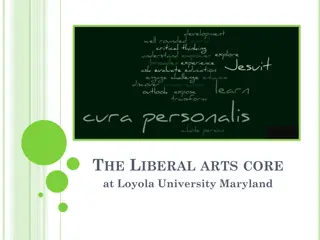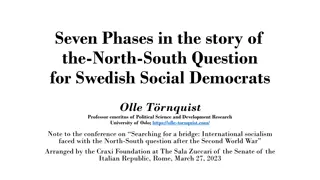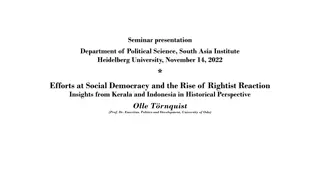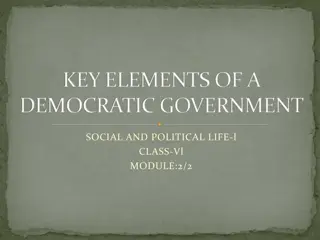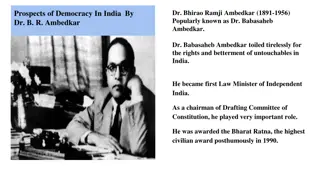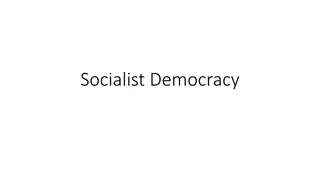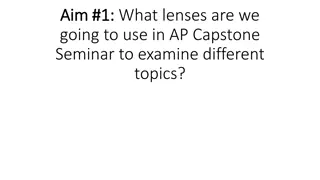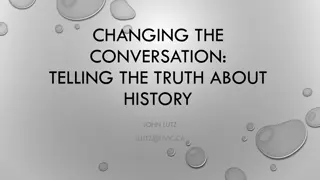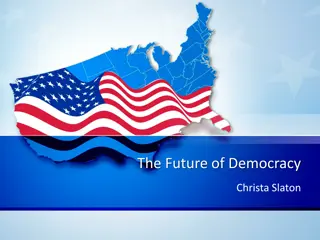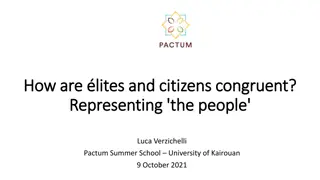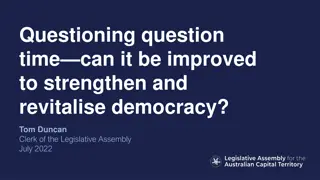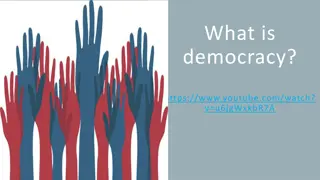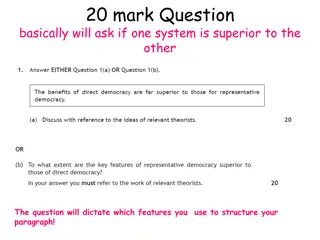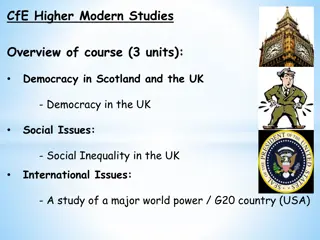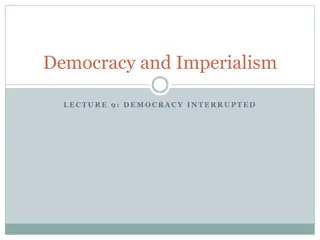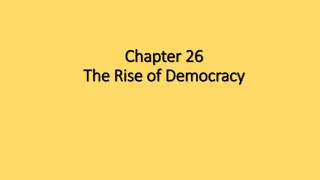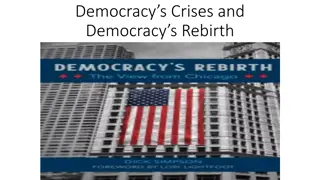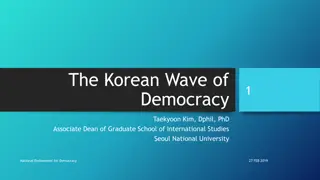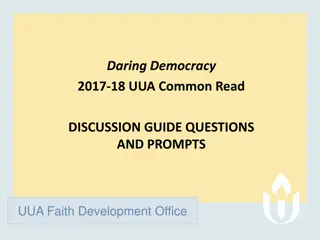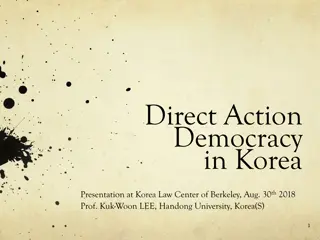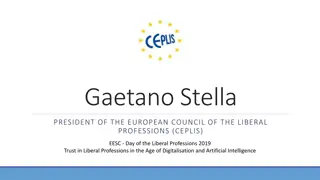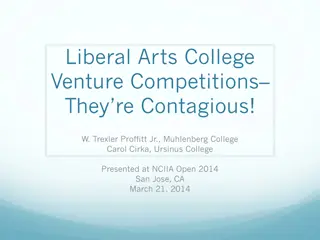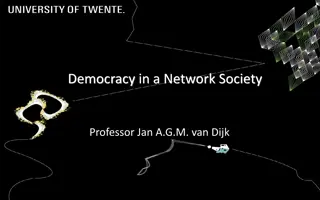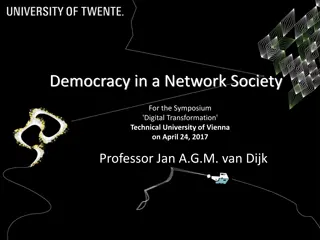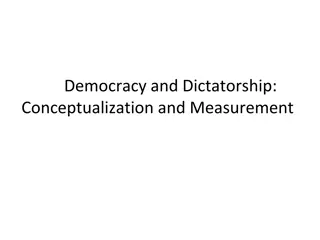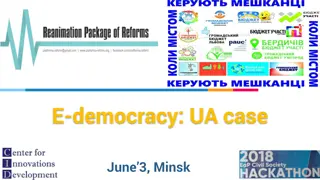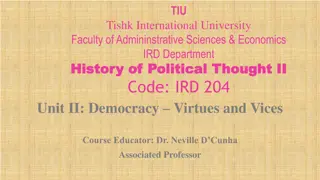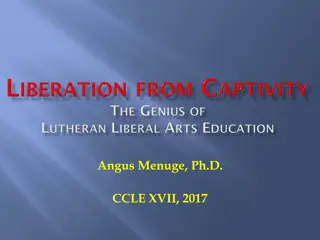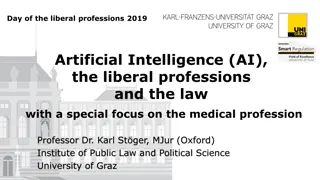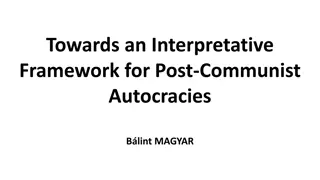Loyola University Maryland Liberal Arts Core Overview
The Liberal Arts Core at Loyola University Maryland emphasizes a well-rounded education through courses in Humanities, Social Sciences, Mathematical Sciences, and Natural Sciences. Students take 15 core courses in liberal arts, including writing, history, literature, language, philosophy, theology,
2 views • 19 slides
Understanding Civil Society: Concepts, Challenges, and Implications
Explore the dynamics of civil society, from its dense network of groups to its role in democracy. Delve into the typology of Civil Society Organizations, the connection between civil society and democracy, and the unique landscape of civil society in Norway. Engage in thought-provoking discussions o
0 views • 9 slides
Phases of the North-South Question and Social Democracy Evolution
Explore the evolution of Social Democracy in relation to the North-South question through seven phases outlined by Olle Törnquist. The discussion spans from the 1930s to modern times, highlighting shifts in international cooperation, economic ideologies, and political conditions that have influence
0 views • 10 slides
Efforts at Social Democracy and Rise of Rightist Reaction: Insights from Kerala and Indonesia
Comparative historical analysis explores efforts at social democracy in Kerala and Indonesia, highlighting successes and failures post-independence. Examining socio-political dynamics, the presenter delves into the collapse of liberal democracy waves and the challenges faced by progressives globally
0 views • 18 slides
Understanding Key Elements of a Democratic Government
Democracy encompasses key elements like participation, conflict resolution, and equality. Learn about apartheid in South Africa, the importance of citizen participation in decision-making, different ways to participate in a democracy, resolving conflicts, and examples like water disputes. Explore th
0 views • 12 slides
Challenges of Caste System and Democracy in Indian Society
Dr. B.R. Ambedkar discusses the prospects of democracy in India, highlighting the challenges posed by the caste system. He emphasizes the need for true societal unity and cooperation to achieve democracy beyond a mere form of government. The Caste system's deep-rooted inequality and lack of shared e
0 views • 10 slides
Evolution of Citizenship in Liberal Democracy
Citizenship within liberal democracy entails equal rights, duties, liberties, and constraints for individuals within a political community. The entrenchment of civil and political rights has shaped the struggle for membership and participation in political communities. Civil rights, essential for in
1 views • 11 slides
Understanding Socialist Democracy: A Political Ideology Explained
Socialist democracy is a political idea that combines elements of democracy and socialism, rejecting capitalism and authoritarian socialism. Proponents advocate for democratic decision-making and public ownership of the means of production. They believe in economic equality, government regulation of
2 views • 13 slides
Exploring Different Lenses in AP Capstone Seminar for Democracy Questions
Delve into various lenses such as environmental, scientific, economic, political and historical, artistic and philosophical, cultural and social, futuristic, and ethical to examine democracy-related questions in AP Capstone Seminar. Topics range from environmental impact to the role of democracy in
6 views • 10 slides
Promoting Democracy and Rights through Education in South Africa
This presentation by UF4SGBs to the Parliamentary Portfolio Committee on Basic Education discusses the key concepts of democracy and rights in education, emphasizing equal access and eliminating discriminatory practices in South Africa. It outlines the country's commitment to equity and redress in e
0 views • 14 slides
Evolution of Liberal Citizenship Theory
The liberal theory of citizenship emphasizes the essential components of right, responsibility, and identity within a political community. It contrasts with pre-capitalist societies by offering a weak sense of membership and reduced citizen obligations. The addition of social rights has brought an e
0 views • 15 slides
The Value of Liberal Arts Education in Today's Job Market
Parents and students are encouraged to consider the benefits of a liberal arts education, as it equips students with essential skills demanded in the current and future job market. Employers value soft skills developed through liberal arts studies, such as critical thinking, communication, and probl
0 views • 20 slides
The Complex History of American Democracy Through Visuals
Explore a collection of images depicting pivotal moments and challenges in American democracy, from historical events like the Civil War and Civil Rights Movement to modern-day issues such as voter suppression and conspiracy theories. Reflect on questions about the current state of democracy, polari
0 views • 26 slides
Understanding the Congruence between Elites and Citizens in Representation
The relationship between elites and citizens in representative democracy is explored, tracing historical antecedents, the marriage between representation and democracy, modern representation models, and the roles of representatives. Key themes include responsiveness, responsibility, formalistic, des
0 views • 9 slides
Strengthening Democracy Through Question Time Reform
Strengthening and revitalizing democracy through improvements in question time is crucial, especially in light of declining trust in government and satisfaction with democracy. Calls for eliminating scripted government questions, like Dorothy Dixers, in favor of promoting genuine accountability and
1 views • 17 slides
Liberal Democracy and Citizenship: Rights, Duties, and Participation
Citizenship in liberal democracies entails equal rights, duties, liberties, and constraints, with a focus on civil and political rights. The entrenchment of these rights has been key in establishing popular sovereignty and individual autonomy. Civil rights, developed in the 18th century, centered on
2 views • 16 slides
Understanding Democracy: Evolution, Characteristics, and Debates
Democracy has evolved from being viewed pejoratively to a widely respected system of government. The concept of democracy has been scrutinized throughout history with discussions on its nature, different democratic models, and operational mechanisms. Key characteristics include rule by the people, e
2 views • 19 slides
Understanding Democracy: Key Features and Types Explored
Explore the concept of democracy, its key features, types like direct and representative democracy, and the advantages and disadvantages associated with each form. Discover examples from Ancient Greece to modern systems in Switzerland and the UK, providing insights into how citizens can engage in de
0 views • 12 slides
Analysis of Direct Democracy vs. Representative Democracy Features
In this academic guide, the focus is on analyzing and comparing key features between direct democracy and representative democracy. The essay structure, paragraph breakdown, and example paragraphs provided offer a framework to evaluate the strengths and weaknesses of each democratic system. Through
0 views • 8 slides
Overview of CfE Higher Modern Studies Course: Democracy, Social Inequality, and International Issues
This course provides an in-depth look at various aspects of modern society, including democracy in Scotland and the UK, social inequality issues, and the study of a major world power (USA) within the context of the G20 countries. Students will explore topics such as constitutional arrangements, voti
0 views • 18 slides
Challenges to Democracy: An Historical Perspective
Explore the historical instances of democracy being interrupted in Ancient Athens, from the Periclean Peloponnesian War to the oligarchic regimes of 411 and 403 BC. Delve into the reasons behind the dissolution of democracy, the responses of Athenians to such interruptions, and the oligarchs' aims t
0 views • 24 slides
Understanding Democracy in Western Societies
Democracy is a system of government where citizens exercise power through voting. It can take the form of direct democracy or representative democracy. In constitutional democracy, the majority's powers are limited by the constitution to protect minority rights. The concept of democracy entails the
0 views • 11 slides
Perspectives on Modernization, Development, and Democracy
Various perspectives on the relationship between modernization, development, and democracy are explored, including the linear view of democracy as a modernization endpoint, the trade-off between development and democracy, and the case for democracy despite authoritarian advantages. The debate betwee
0 views • 16 slides
The Evolution of Democracy in Ancient Greece
Democracy in ancient Greece evolved through stages starting from monarchies to oligarchies, tyrannies, and finally to Athenian direct democracy, where all citizens had the right to vote on every issue. Monarchies saw one person inheriting power, oligarchies involved a few wealthy people sharing powe
0 views • 8 slides
Democracy and Imperialism: Origins and Legacy of Classical Athens
The module explores the origins, nature, and legacy of democracy in Classical Athens (508-322 BC), shedding light on the political structures, principles, and impact of Athenian democracy. Topics range from the supreme authority of the Assembly to the accountability of magistrates, providing insight
0 views • 16 slides
Challenges and Opportunities for Democracy's Future
Exploring the current crises facing democracy, this content highlights key challenges such as racial and income inequality, systemic racism, money in politics, low voter participation, polarization, corruption, and structural issues. It also addresses current crises like the pandemic, economic reces
0 views • 7 slides
The Korean Wave of Democracy: Advancing Democracy in Asia and Beyond
This collection of images explores South Korea's role in promoting democracy through various initiatives such as hosting international conferences, leveraging events like the Pyeongchang Olympics for peacebuilding, and supporting governance reform and media development in developing countries. It hi
0 views • 9 slides
Engaging with Democracy: Discussion Guide and Action Steps
Delve into the thought-provoking content of "Daring Democracy" with discussion guide questions and prompts provided by UUA's Faith Development Office. Explore your first impressions, memories of democracy participation, and living out principles within today's democracy. Take actionable steps toward
0 views • 26 slides
Direct Action Democracy in Korea Presentation
A presentation by Prof. Kuk-Woon LEE on the concept of Direct Action Democracy in Korea, focusing on the Candlelight Rally of 2016-2017 and the need for action, deliberation, and decision-making in democracy. The presentation explores beyond the traditional dichotomy of direct and indirect democracy
0 views • 38 slides
The Link Between Democracy and Human Rights
The core of democracy lies in promoting equal human worth and self-determination. There is a strong connection between human rights, democracy, good governance, and development. Democracy allows people to participate in decision-making, ensuring their views are heard. It upholds freedom, equality, f
0 views • 15 slides
Advancing Liberal Professions in the Digital Era: Insights from CEPLIS President Gaetano Stella
Gaetano Stella, the President of the European Council of the Liberal Professions (CEPLIS), emphasizes the impact of digitalization on liberal professions, focusing on human rights protection, trust, and the need for AI development. The digital revolution has led to changes in organizational structur
0 views • 12 slides
Exploring the Intersection of Liberal Arts and Business Education
This content delves into the fusion of liberal arts and business education, emphasizing the importance of blending diverse fields for holistic development. It discusses the rising trend of venture competitions in liberal arts colleges, challenges faced in integrating entrepreneurship into traditiona
0 views • 14 slides
Digital Democracy in a Network Society: Promises and Pitfalls
In "Democracy in a Network Society" by Professor Jan A. G. M. van Dijk, the concept of digital democracy is explored, focusing on promises made in the 1980s and 1990s. The text discusses the definition of digital democracy, potential pitfalls in thinking about technological transformations, and the
0 views • 16 slides
Digital Democracy in a Network Society Symposium Overview
The symposium 'Digital Transformation' at the Technical University of Vienna in April 2017, led by Professor Jan A. G. M. van Dijk, delved into the concept of digital democracy. It explored the definition of digital democracy, promises made in the 1980s and 1990s, pitfalls in technological transform
0 views • 16 slides
Evolution of Democracy: From Early Forms to Modern Systems
Explore the evolution of democracy from early forms where rulers sought consent to govern to modern systems of democratic rule. Early democracy emerged when rulers needed to seek the approval of those they governed, leading to limited participation and direct democracy in various societies. However,
0 views • 66 slides
Advancing Democracy Through E-Democracy Initiatives in Ukraine
Explore the various e-democracy initiatives in Ukraine, including participatory budget projects, citizen engagement platforms, and rankings within the UN. Discover the role of Kyiv's local government in supporting e-democracy and the future models shaping the community. Learn about the effective too
0 views • 29 slides
Democracy: Virtues and Vices in Modern Politics
In modern politics, the concept of democracy is often unquestioned, with its virtues taken for granted and its vices rarely exposed. This course delves into the historical perspectives on democracy, exploring its advantages for both individuals and the community. While democracy can foster a sense o
0 views • 27 slides
Philosophy of Liberal Arts Education and Freedom
Classical education programs at CUW emphasize a philosophy major with a focus on primary sources, history of philosophy, worldviews, bioethics, and apologetics. This education model seeks to equip individuals for freedom, drawing on the roots of liberal education in the concept of liberty as a means
0 views • 47 slides
The Impact of Artificial Intelligence on Liberal Professions in 2019
Discussing the influence of Artificial Intelligence (AI) on liberal professions, with a special emphasis on the medical field, as presented by Professor Dr. Karl St. ger. Exploring the definition of liberal professions, McCarthy's views on intelligence simulation by machines, the core aspects of Mac
0 views • 18 slides
Framework for Understanding Post-Communist Autocracies
The illusion of linear progress towards liberal democracies post-1989-1990 revolutions is challenged by the complex reality of post-communist autocracies. This framework explores the characteristics of democracy, autocracy, and dictatorship to categorize regimes, highlighting the challenges and nuan
0 views • 41 slides
